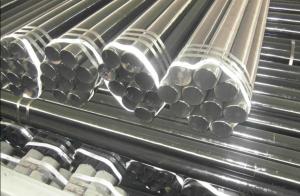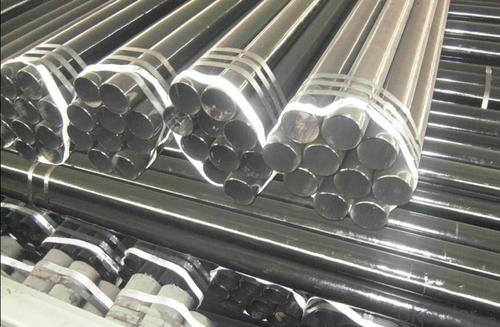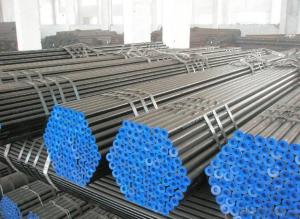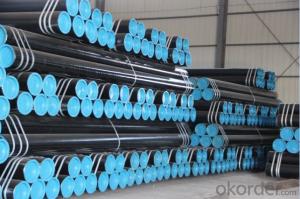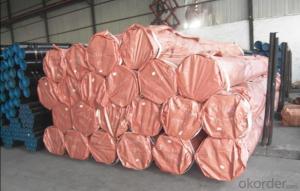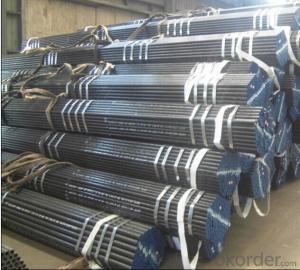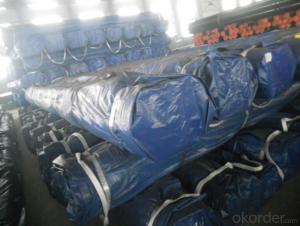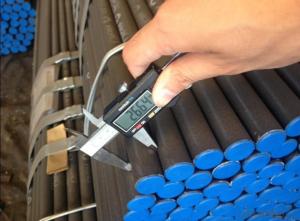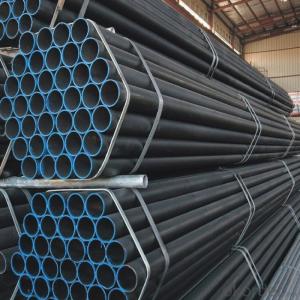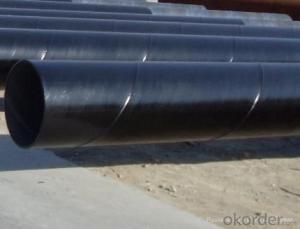Carbon seamless steel tube DIN17175 ST35
- Loading Port:
- Tianjin
- Payment Terms:
- TT OR LC
- Min Order Qty:
- 10 m.t.
- Supply Capability:
- 10000 m.t./month
OKorder Service Pledge
OKorder Financial Service
You Might Also Like
1. Commodity Name: Seamless steel pipe
2. Standard: API,GB,ASTM,ASME,DIN
3. Quality grade: 10#, 20#, A106B, A53B, API 5L B, Q235, Q345, ST37-2, ST 45, ST52.etc.
4. Dimension:
OD: 1/2"-24"
WT: 2.5-80mm, SCH10~SCH40~XXL
length: 5.8m,6m,8m,9m,12m
5. Technique: Hot Rolled/Cold Rolled/ Cold Drawn
6. application
carbon seamless steel pipes are widely used in gas, water and oil, transpotation;constructions;Bridge,highway,windows of model steel door; building materials;fences;heating facilities Fluid Pipe;conduit pipe,scaffolding pipe.etc.
7. Payment Terms: L/C D/A D/P T/T
8.packing and shipment
Packaged in bundles,as per customers' requirements, it can also bepackagesd as beveled ends, typed marking, black painting, plastic caps protection,woven bags packing
For 20" container the max length is 5.8m; For 40" container the max length is 12m. other options are available based on customer requests. Please discuss when placing orders.
9. Surface: painted with varnish;
10. Plastic caps at ends.
11. Tolerance: OD +1%/-1%
WT +12.5%/-10%
12. Chemical composition:
Models of Steel Pipes | Chemical Component | |||||||
Steel 20 (ASTM A106B) | C | Si | Mn | P | S | Cu | Ni | Cr |
0.17~0.24 | 0.17~0.37 | 0.35~0.65 | 0.035max | 0.035max | 0.25max | 0.25max | 0.25max | |
Steel45 (ASTM 1045) | 0.42~0.50 | 0.17~0.37 | 0.50~0.80 | 0.035max | 0.035max | 0.25max | 0.25max | 0.25max |
16Mn(Q345B) | 0.12~0.20 | 0.20~0.55 | 1.20~1.60 | 0.035max | 0.035max | 0.25max | 0.25max | 0.25max |
45Mn2 ( ASTM1345) | 0.42~0.49 | 0.17~0.37 | 1.40~1.80 | 0.035max | 0.035max | 0.3max | 0.3max | 0.30max |
- Q: How are steel pipes used in the manufacturing of power plants?
- Steel pipes are extensively used in the manufacturing of power plants for various applications such as transporting water, steam, and other fluids, as well as for structural purposes. They are commonly used for the construction of boiler tubes, heat exchangers, condensers, and steam distribution systems. Additionally, steel pipes are essential for conveying fuel gases and air in power plants, ensuring efficient operation and safety.
- Q: What is an electric welded pipe (EFW)? Seek help!
- Pipe and pipe fittings should be suitable for the gap, usually with micro force insertion is appropriate, the gap is too large or too small will affect the quality of the interface.Check the depth of the plug and slip the spigot into the socket and position correctly.
- Q: How are steel pipes used in the telecommunications sector?
- Steel pipes are commonly used in the telecommunications sector for various purposes. Firstly, steel pipes are used as conduit for underground cable installations. These pipes provide protection and support to the fiber optic cables that carry data and voice signals across long distances. The sturdy nature of steel pipes ensures that the cables remain safe from external factors such as moisture, rodents, and accidental damage. Additionally, steel pipes are used in the construction of telecommunication towers and masts. These structures require a strong and durable material to support the weight of antennas, transmitters, and other equipment. Steel pipes, with their high tensile strength and resistance to harsh weather conditions, are ideal for this purpose. Moreover, steel pipes are used for the installation of overhead communication lines. These lines are often suspended between poles or towers, and steel pipes are used as supports or brackets to hold the cables in place. The corrosion-resistant properties of steel make it a reliable choice for outdoor installations that are exposed to the elements. In summary, steel pipes play a crucial role in the telecommunications sector by providing protection, support, and durability to cable installations, tower constructions, and overhead communication lines. Their strength and resistance to environmental factors make them an essential component in building and maintaining reliable telecommunications networks.
- Q: What does cathodic protection of steel tubes mean?
- The corrosion of metals causes great economic losses directly or indirectly. Foreign statistics show that every year due to corrosion and scrap metal materials, equivalent to 20~40% of metal production, the world every year due to corrosion and loss of metal reached more than 1 tons.
- Q: What are the different factors affecting the flow rate of steel pipes?
- There are several factors that can affect the flow rate of steel pipes. 1. Pipe diameter: The size of the pipe plays a significant role in determining the flow rate. Generally, larger diameter pipes allow for greater flow rates, as they have a larger cross-sectional area for the fluid to pass through. 2. Pipe length: The length of the pipe also affects the flow rate. Longer pipes tend to have higher friction losses, which can reduce the flow rate. Additionally, longer pipes may require higher pressure to maintain the desired flow rate. 3. Fluid viscosity: The viscosity of the fluid passing through the pipe is an important factor. Viscous fluids, such as heavy oils, have a higher resistance to flow, leading to lower flow rates. On the other hand, less viscous fluids, like water, have lower resistance and can achieve higher flow rates. 4. Pressure difference: The pressure difference across the pipe is a driving force for the flow. A higher pressure difference will result in a higher flow rate, while a lower pressure difference will reduce the flow rate. 5. Surface roughness: The roughness of the inner surface of the pipe affects the flow rate. Rougher surfaces create more turbulence and friction, resulting in a lower flow rate. Smoother surfaces, on the other hand, minimize turbulence and friction, allowing for a higher flow rate. 6. Temperature: The temperature of the fluid can impact its viscosity and density, which in turn affects the flow rate. Higher temperatures generally reduce the viscosity of fluids, leading to increased flow rates. 7. Pipe material: Different pipe materials have varying roughness and resistance to flow. Steel pipes, for example, typically have a smoother inner surface compared to pipes made of other materials, resulting in higher flow rates. 8. Pipe fittings and bends: The presence of fittings, valves, and bends in the pipe can cause flow restrictions and pressure drops, which can decrease the flow rate. Proper design and placement of these components can minimize their impact on the flow rate. Overall, the flow rate of steel pipes is influenced by a combination of these factors, and understanding their effects is crucial for designing and optimizing fluid flow systems.
- Q: Is the electric pipe used with steel pipe or PVC pipe?
- Electric pipe laying is generally divided into the following circumstances:1) the explosion-proof area must be galvanized steel pipe and explosion proof flexible pipe (used for front end equipment connection);2) non explosion-proof area can use KBG pipe or PVC tube, the former is higher cost, but the installation is firm, the latter is low cost, easy to construction, and in the rain where it will not rust, but compared to the KBG pipe may be damaged.
- Q: How do steel pipes differ from other types of pipes?
- Steel pipes differ from other types of pipes in several ways. Firstly, steel pipes are incredibly durable and strong, making them suitable for carrying high-pressure fluids and gases. They have a high resistance to corrosion and can withstand extreme temperatures, making them ideal for various industrial applications. Additionally, steel pipes have a smooth interior surface, which reduces friction and allows for efficient flow of liquids or gases. They are also highly versatile, as they can be easily welded, threaded, or bent to fit specific project requirements. Overall, steel pipes are known for their strength, durability, and versatility, making them a preferred choice in many industries.
- Q: Galvanized steel pipe, PPR pipe, PE pipe, U-PVC pipe and HDPE double wall corrugated pipe and what is the difference between the characteristics of
- U-PVC tubes are hard poly vinyl pipes, because they contain chlorine, so they are mainly used in sewer pipes or electrical wiring;HDPE double wall corrugated pipe is a high-density polyethylene pipe, because of its excellent electrical insulation performance, now mainly used for distribution line arrangement.
- Q: Are steel pipes suitable for conveying fluids?
- Yes, steel pipes are suitable for conveying fluids. They are widely used in various industries for transporting liquids and gases due to their high strength, durability, and resistance to corrosion.
- Q: What is the typical lifespan of steel pipes?
- The lifespan of steel pipes can differ based on several factors, including the steel quality, environmental conditions, and pipe maintenance and usage. On average, steel pipes typically last between 50 and 100 years. However, by installing them correctly, conducting regular inspections, and maintaining them appropriately, steel pipes can often surpass this lifespan and offer dependable service for many decades. It is worth noting that corrosion, erosion, and external damage can affect the longevity of steel pipes. Therefore, it is essential to implement preventive measures and carry out necessary repairs to guarantee their durability.
Send your message to us
Carbon seamless steel tube DIN17175 ST35
- Loading Port:
- Tianjin
- Payment Terms:
- TT OR LC
- Min Order Qty:
- 10 m.t.
- Supply Capability:
- 10000 m.t./month
OKorder Service Pledge
OKorder Financial Service
Similar products
Hot products
Hot Searches
Related keywords
